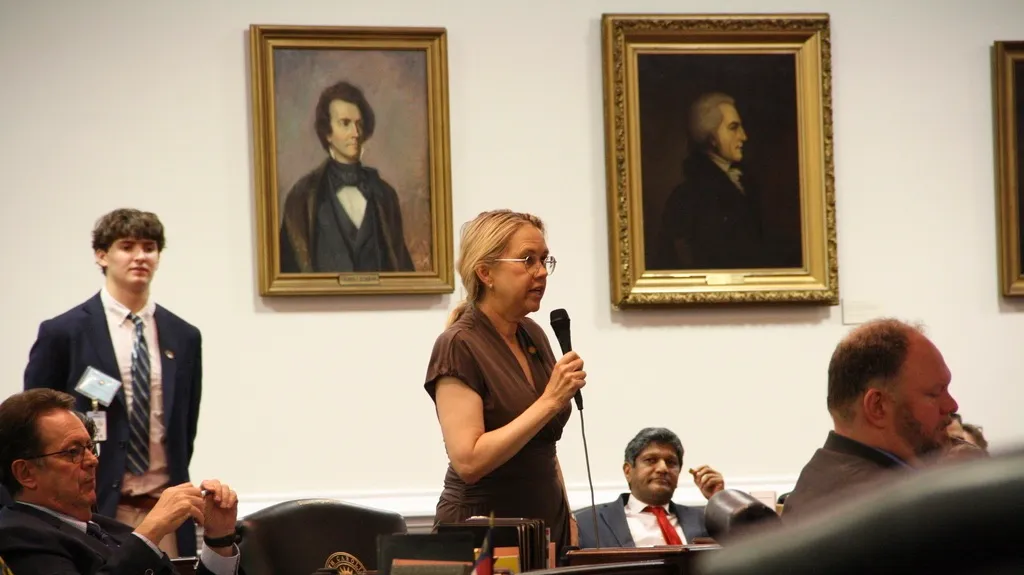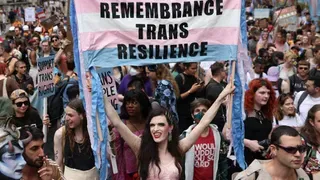February 7, 2012
The Black-Gay Divide: A Clash of Race, Religion & Rights
Peter Cassels READ TIME: 6 MIN.
As public opinion moves toward supporting gay rights, especially marriage equality, the African-American community has been slower to get on board. While polls show a slight majority of Americans favoring same-sex marriage, just 30 percent of non-Hispanic blacks do; 59 percent are opposed, according to a 2010 Pew Research survey.
There's evidence that the divide between African-Americans and the gay community is narrowing, but activists say much more work needs to be done. More than three years after California voters approved Proposition 8, the referendum that banned same-sex marriage, bitterness within the gay community over African-American support of the measure remains.
Exit polls showed that as many as 70 percent of black voters supported the referendum. Much of the opposition to same-sex marriage came from African-American churches, which are very influential, although most of the funding dollars came from the Mormon and Roman Catholic churches.
In demonstrations after the November election, there were bitter words on both sides. Home videos showed at least one white gay protester using "the n word" on blacks in the street. Many gay Californians were especially angry that polls uniformly showed a good number of blacks splitting their vote in the Golden State: a gay-friendly liberal for president (not incidentally, a black man); but against gay marriage.
It is true that several of the largest and most prominent predominantly African-American congregations of various Protestant and Evangelical denominations hold anti-gay positions. Many of their pastors' rhetoric on the issue skirts Westboro Baptist Church in their denunciations.
A majority of the member churches in the National Baptist Convention, for example, condemn homosexuality. The largely black sub-sect is the world's second largest Baptist church affiliation.
The 5.5 million-member Church of God in Christ, a Pentecostal denomination, has long made it clear that it maintains the same position. It has historically been black dominated.
The 2.5 million-member African Methodist Episcopal Church has declared opposition to same-sex marriage and the ordination of openly gay clergy. The church was the result of the split over the slavery issue and remains the most important black mainstream Protestant communion in this country.
Hatred & Fear of Gay Men & (Especially) Gay Sex
The pastors for these churches do not hold anything back when they are discussing homosexuality, for which they seem to have a visceral distaste. On Jan. 18, a coalition of black pastors and pro-family organizations protested outside the headquarters of the Southern Poverty Law Center in Montgomery, Ala. The center, which has traditionally sought to counteract racist organizations in the south, had categorized pro-family organizations as "hate groups" for opposing gay rights.
Among the ministers joining the protest was Pastor Patrick Wooden, a prominent North Carolina minister. "It breaks my heart that a time-honored civil rights organization that has done so much good, would, for whatever reason, buy into this lie," Wooden said in an interview with Peter LaBarbara of Americans For Truth About Homosexuality before the protest.
The very fact that Americans for Truth, perhaps the most vitriolic anti-gay organization in the United States, helped spearhead the protests, shows the animosity of people like Wooden.
"I think every African-American ought to be appalled, ought to be angry, and begin to wave their fist in the air and declare black power and say to the homosexual lobbyists, how dare you compare your wicked, deviant, immoral, self-destructive, anti-human sexual behavior to our beautiful skin color?" Wooden added.
He also claimed that gay men "have to wear a diaper" because of "what happens to the male anus" after anal sex.
"The God of the Bible made the human sperm, the God of the Bible designed it and it was not designed to be emptied into an area that is filled with feces," Wooden asserted. Gay sex would "most certainly mean the extinction of the human race," according to Wooden (who apparently hasn't talked to many gay men, the vast majority of whom hardly expect the entire human species to turn gay).
Arguing Over Martin Luther King's Legacy
Pointedly, Martin Luther King, Jr., never publicly expressed his views of homosexuality. In fact, Bayard Rustin, his most trusted and closet adviser and one of his most famous organizers, was openly gay in an era when that was unacceptable in white and black circles.
King's widow Coretta Scott King before her death spoke repeatedly in supporting gay rights and said her husband would have been in favor of marriage equality. Speaking at the National Gay and Lesbian Task Force's Creating Changing conference in 2000, she said rights for gays and lesbians are an important part of the civil rights struggle.
In a 2005 speech at Richard Stockton College in New Jersey, King's widow also spoke out against a proposed constitutional amendment that would make same-sex marriage illegal.
"Gay and lesbian people have families, and their families should have legal protection, whether by marriage or civil union," said King. "A constitutional amendment banning same-sex marriages is a form of gay bashing, and it would do nothing at all to protect traditional marriages."
That hasn't stopped some African Americans from contending that King would not have approved of gay rights or marriage equality. Writing in the Jan. 23 issue of The New Black Magazine, Seattle Post-Intelligencer columnist Ambra Nykol contended that liberals and gay activists have "hijacked" the King legacy.
Nykol wrote that because the civil rights leader was a "Bible-believing Baptist," "we can deduce that he probably did not condone homosexuality as a lifestyle."
NAACP & Welcoming Churches
Many African-American organizations, such as the NAACP, however, are among those strongly supporting gay rights.
So too are some African-American churches. One is the Covenant Baptist United Church of Christ in Washington, D.C., where its pastors, Dennis and Christine Wiley, not only welcome and discuss gay rights, but also perform same-sex marriages.
That church and others were part of the religious coalition that supports marriage equality, which is now legal in Washington. The issue pitted black ministers against other black ministers in and around the District.
Wade Henderson, president and CEO of the Leadership Conference on Civil and Human Rights, wrote in the Baltimore Sun on Jan.12 that blacks should support marriage equality legislation pending in the Maryland Legislature. Henderson contended that such support is essential despite his assertion that white LGBT advocates sometimes take their comparison with the African-American civil rights struggle too far.
"Terms like 'gay is the new black' are inherently disrespectful to the black experience in America," he wrote. "These types of misleading slogans obscure the uniqueness of both groups' struggles in an attempt to make a neat and tidy analogy.
"After all, gays and lesbians were never enslaved or subject to the harsh Jim Crow tactics of oppression, lynching, and intimidation in the way that blacks were.
"And yet while their story of oppression and injustice is not the same as ours, it is equally valid. African-Americans recognize injustice when we see it. Gays and lesbians have been incarcerated, brutalized, lobotomized, raped, castrated, and robbed of their jobs, families and children."
Henderson also encouraged LGBTs to join African Americans in their own continuing struggle for civil rights.
A major problem in homophobic African-American churches is that they are unaware that some in their congregations may be gay or lesbian. (Or at least they pretend that they are unaware; the proverbial 800-pound gorilla in the sanctuary has become the butt of several jokes in recent times.)
Two African-American LGBT activists EDGE interviewed said education is the solution. "That's critical," emphasized NGLTF Deputy Executive Director Darlene Nipper. "We need to speak more openly about who we are."
Nipper points to the many gay men and lesbians active in black congregations who are not out. Although she is hopeful that black-gays divide "is narrowing a bit," she added "I don't know if we're overemphasizing the point." As for all of those rabidly homophobic black ministers, she sees them as "an indication of how far we have to go."
The NGLTF is working with church coalitions in Maryland to get marriage equality passed. While the majority are mainly white congregations, some at least are black dominated, Nipper pointed out. She hopes that supportive pastors will educate "folks within their pews" and colleagues who currently are not accepting.
Part of the problem, according to Sharon Lettman-Hicks, executive director of the National Black Justice Coalition, is that people tend to view the neither LGBT nor African-American communities as monolithic, to the detriment of both cultures.
A mission of the organization is to help both sides overcome the stereotypes that have built up since the Proposition 8 protests. "The black LGBT community is a cultural bridge that's finding some common ground and gaining respect," she says.
The NBJC works closely with the NGLTF and other rights organizations. Lettman-Hicks pointed out that it joined with the Servicemembers Legal Defense Network in the successful fight to repeal the ban on gays in the military.
Gay Rights the White Man's Problem
Unfortunately, many in the black community see the fight for gay rights as a "white gay strategy" rather than "an education and awareness campaign," the activist contended.
"We have to show the black churches and their memberships that they are vilifying the black LGBT community" by being anti-gay, she said. "The first conversation cannot be about marriage."
"I've had black pastors say to me, 'Help me be a more sensitive and a better pastor,' she noted. "We need to help them understand the harm that's been done and engage in issues."
The activist calls ministers who are open to such a dialogue "the moveable middle."
Peter Cassels is a recipient of the National Lesbian and Gay Journalists Association's Excellence in Journalism award. His e-mail address is [email protected].



